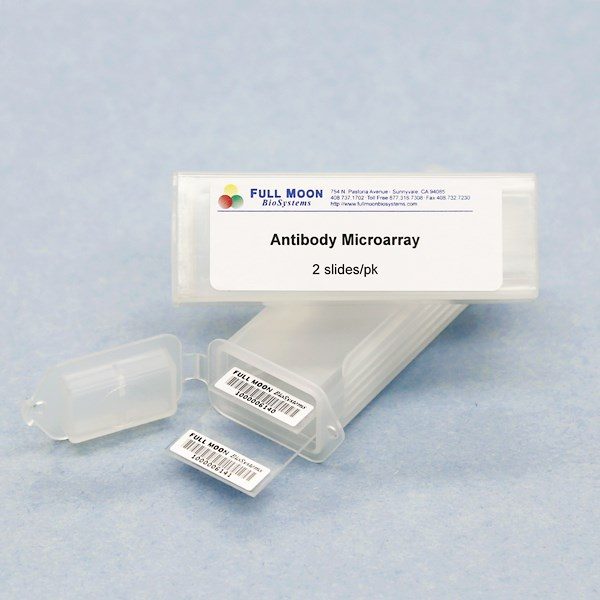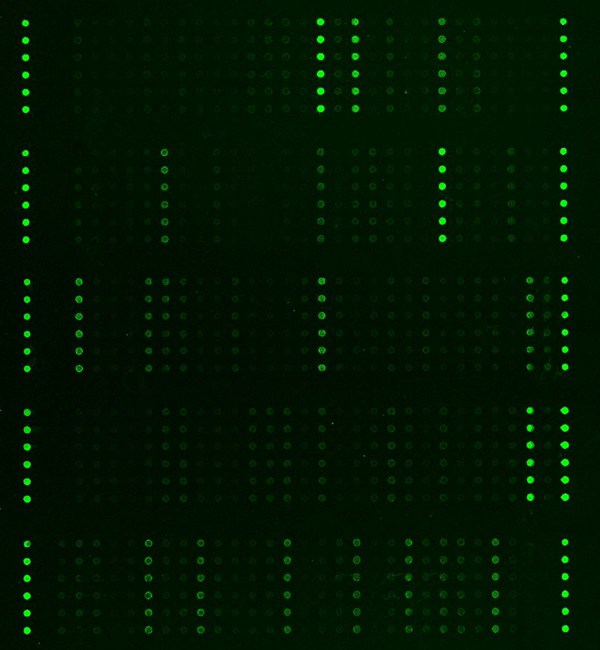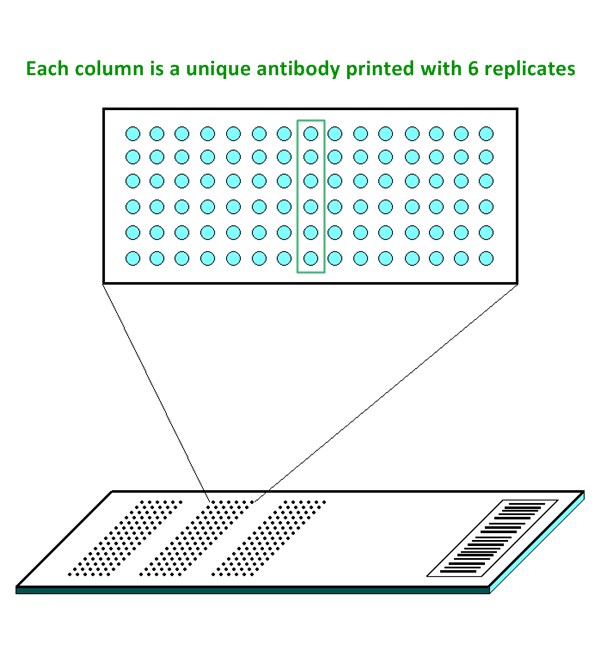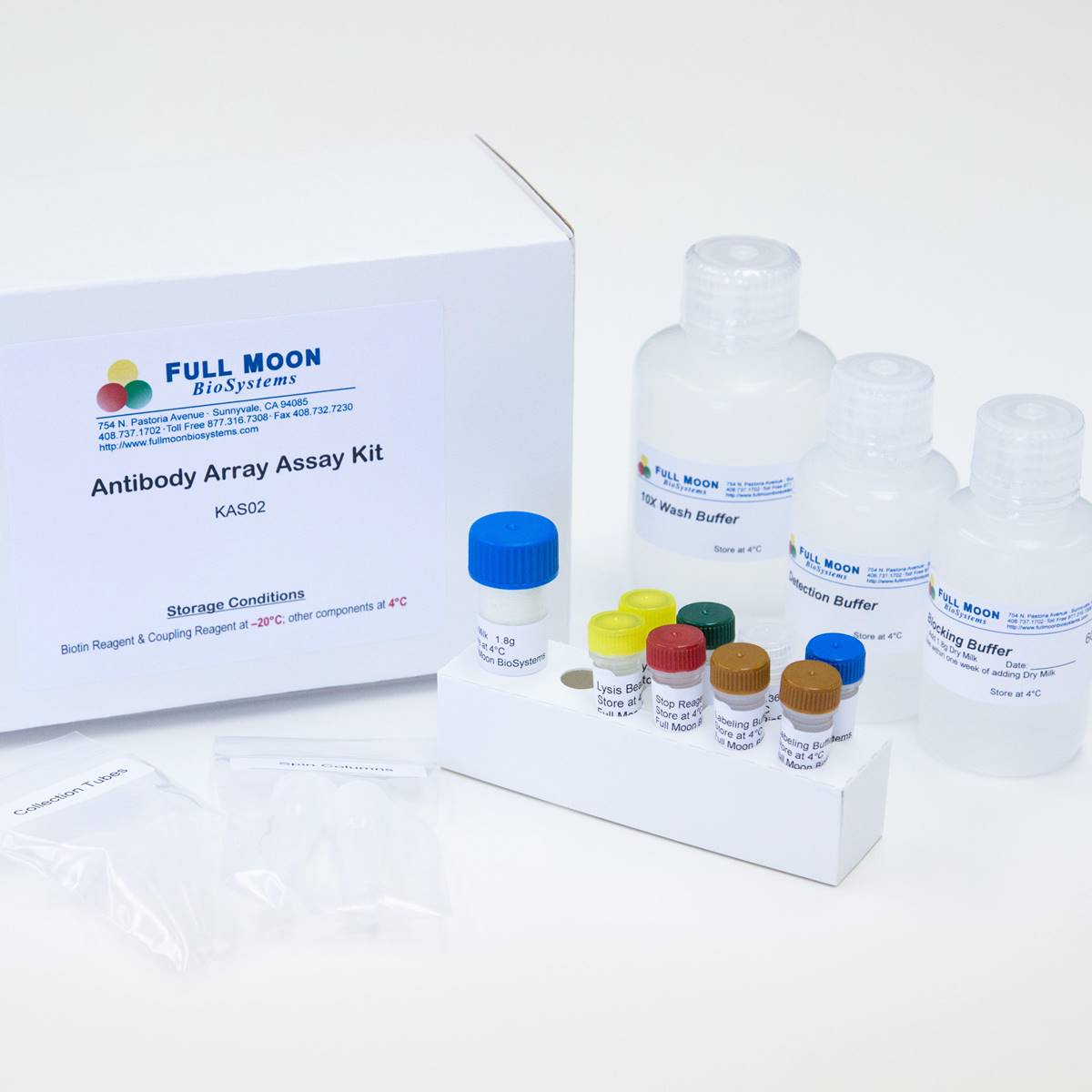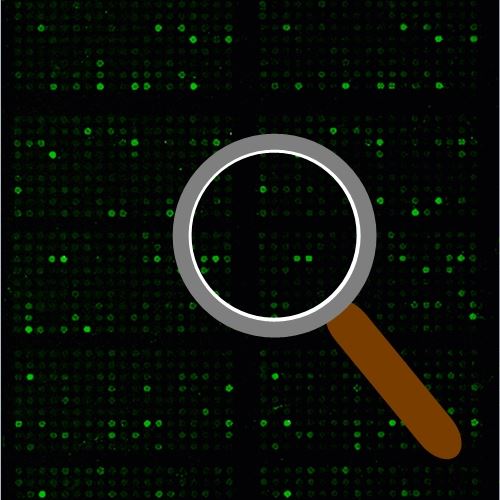Tyrosine Phosphorylation ProArray
Tyrosine Phosphorylation ProArray is a high-throughput ELISA based antibody array for qualitative tyrosine phosphorylation profiling. It is designed for comparing normal samples to treated or diseased samples, and identifying candidate biomarkers. This array features 228 site-specific phospho-tyrosine antibodies, allowing researchers to study tyrosine phosphorylation at specific sites.
Key Features
- Site-specific tyrosine phosphorylation profiling and screening with 228 antibodies
- Antibodies covalently immobilized on 3D polymer coated glass slide
- Fluorescent detection
Specifications
| Product Size: | 2 array slides per package for analyzing two samples (untreated vs. treated) |
| Featured Antibodies: | 228 tyrosine phospho-specific antibodies; 6 replicates per antibody |
| Reactivity: | Human: 100% | Mouse: 95% | Rat: 62% |
| Suitable Sample Type: | Cell lysate | Tissue lysate |
| Detection Method: | Fluorescence | Compatible Scanners |
| Internal Controls: | beta-actin | GAPDH | Negative controls |
| Slide dimensions: | 76 x 25 x 1 mm |
| Storage Condition: | 4°C for 6 months |
Product Details
Abl1 (pTyr204), Abl1 (pTyr412), ACK1 (pTyr284), ACTIN Pan (a/b/g) (pTyr55/53), AKT (pTyr326), AKT1 (pTyr474), ALK (pTyr1507), ALK (pTyr1604), A-RAF (pTyr301/302), AurB (pTyr12), AXL (pTyr691), Bcr (pTyr177), BCR (pTyr360), BLNK (pTyr84), BLNK (pTyr96), Breast tumor kinase (pTyr447), BTK (pTyr222), BTK (pTyr550), c-Abl (pTyr245), c-Abl (pTyr412), Caspase 9 (pTyr153), Catalase (pTyr385), Catenin beta (pCTNNB) (pTyr489), Catenin beta (pTyr654), Catenin delta-1 (pTyr228), Caveolin-1 (pTyr14), CBL (pTyr700), CBL (pTyr774), CD19 (pTyr531), CD22/BL-CAM (pTyr807), CD227/mucin 1 (pTyr1243), CD28 (pTyr218), CD3Z (pTyr142), CD5 (pTyr453), CDC2 (pTyr15), CDK5 (pTyr15), c-Jun (pTyr170), CK1-A/A2 (pTyr294), c-Kit (pTyr721), claudin 3 (pTyr219), claudin 6 (pTyr219), claudin 7 (pTyr210), c-met (pTyr1003), Cortactin (pTyr421), Cortactin (pTyr466), CrkII (pTyr221), CrkL (pTyr207), CSFR (pTyr561), Dab1 (pTyr220), Dab1 (pTyr232), DAPP1 (pTyr139), DDX5/DEAD-box protein 5 (pTyr593), Dok1 (pTyr362), Dok1 (pTyr398), Dok2 (pTyr299), EGFR (pTyr1016), EGFR (pTyr1069), EGFR (pTyr1092), EGFR (pTyr1110), EGFR (pTyr1172), EGFR (pTyr1197), EGFR (pTyr869), EPB41 (pTyr418/660), EPHA2/3/4 (pTyr588/596), EPHB1/2 (pTyr594/604), Ephrin B (pTyr330), Ephrin B1/B2/B3 (pTyr324), Ephrin-B1 (pTyr317), Epo-R (pTyr368), ERK8 (pThr175/177), Etk (pTyr40), ETK (pTyr566), Ezrin (pTyr353), ezrin (pTyr478), FAK (pTyr397), FAK (pTyr407), FAK (pTyr576), FAK (pTyr861), FAK (pTyr925), FER (pTyr402), FGFR1 (pTyr154), FGFR1 (pTyr654), FGFR1 (pTyr766), FLT3 (pTyr842), FLT3 (pTyr969), FRS2 (pTyr436), Fyn (pTyr530), Gab1 (pTyr627), Gab1 (pTyr659), Gab2 (pTyr643), GRB10 (pTyr67), GRF-1 (pTyr1105), GSK3a-b (pTyr216/279), HCK (pTyr410), HER2 (pTyr1221/1222), HER2 (pTyr1248), HER2 (pTyr877), HER3/ErbB3 (pTyr1222), HER3/ErbB3 (pTyr1289), HER4/ErbB4 (pTyr1284), HRS (pTyr334), ICAM-1 (pTyr512), ICK (pTyr159), IGF-1R (pTyr1161), IGF-1R (pTyr1165/1166), IkB-alpha (pTyr305), IkB-alpha (pTyr42), IKK-beta (pTyr188), IKK-beta (pTyr199), IL-10R-A (pTyr496), IL-13R/CD213a1 (pTyr405), IL3R (pTyr593), IL-4R/CD124 (pTyr497), IL7R/CD127 (pTyr449), Integrin b3 (pTyr773), Integrin b3 (pTyr785), IFN-gamma receptor alpha chain precursor (pTyr457), IR (pTyr1355), IR (pTyr1361), ITGB4 (pTyr1510), JAK1 (pTyr1022), JAK2 (pTyr1007), JAK2 (pTyr221), JNK1/2/3 (pThr183/Tyr185), KIT (pTyr703), KIT (pTyr936), Kv1.3/KCNA3 (pTyr135), Kv2.1/Kcnb1 (pTyr128), LAT (pTyr171), LAT (pTyr191), LCK (pTyr192), LCK (pTyr393), LCK (pTyr504), LYN (pTyr507), M-CSF Receptor (pTyr809), MER/SKY (pTyr749/681), Met (pTyr1234), Met (pTyr1349), Met (pTyr1356), NMDA NR2A/B (pTyr1246/1252), NMDAR2B (pTyr1472), p130Cas (pTyr165), p130Cas (pTyr410), p38 MAPK (pTyr182), p38 MAPK (pTyr322), p44/42 MAPKinase (pTyr204), p73 (pTyr99), Paxillin (pTyr118), Paxillin (pTyr31), PDGF-R alpha (pTyr849), PDGF-R beta (pTyr1021), PDGF-R beta (pTyr740), PDGF-R beta (pTyr751), PECAM-1 (pTyr713), PI3-kinase p85-alpha (pTyr607), PI3-kinase p85-subunit a/g (pTyr467/199), Pim-1 (pTyr309), PKC alpha (pTyr657), PKC delta (pTyr52), PKC delta (pTyr313), PKC delta/PKCD (pTyr64), PKD1/PKC mu (pTyr463), PLCG1 (pTyr1253), PLCG1 (pTyr771), PLCG1 (pTyr783), PLCG2 (pTyr1217), PLCG2 (pTyr753), PLD2 (pTyr169), PP2A-a (pTyr307), PTPRA (pTyr798), Pyk2 (pTyr402), Pyk2 (pTyr579), Pyk2 (pTyr580), Pyk2 (pTyr881), RAD51 (pTyr315), RAD52 (pTyr104), Raf1 (pTyr341), RapGEF1 (pTyr504), Ret (pTyr905), RGS16 (pTyr168), SAPK/JNK (pTyr185), Shc (pTyr349), Shc (pTyr427), SHP-1 (pTyr536), SHP-2 (pTyr542), SHP-2 (pTyr580), SLP-76 (pTyr128), Src (pTyr216), Src (pTyr418), Src (pTyr529), STAM2 (pTyr192), STAT1 (pTyr701), STAT2 (pTyr690), STAT3 (pTyr705), STAT4 (pTyr693), STAT5A (pTyr694), STAT6 (pTyr641), SYK (pTyr323), SYK (pTyr348), SYK (pTyr525), Synuclein alpha (pTyr125), Synuclein alpha (pTyr133), Synuclein alpha (pTyr136), TFII-I (pTyr248), TIE2 (pTyr1108), Trk A (pTyr680/681), Trk A (pTyr701), Trk A (pTyr791), Trk B (pTyr515), Trk B (pTyr705), TYK2 (pTyr1054), Vav1 (pTyr174), Vav2 (pTyr142), VE-Cadherin (pTyr731), VEGFR1 (pTyr1333), VEGFR2 (pTyr1054), VEGFR2 (pTyr1059), VEGFR2 (pTyr1175), VEGFR2 (pTyr1214), VEGFR2 (pTyr951), Vinculin (pTyr821), WASP (pTyr290), WAVE1 (pTyr125), WWOX (pTyr33), ZAP-70 (pTyr292), ZAP-70 (pTyr315), ZAP-70 (pTyr319), ZAP-70 (pTyr493)
The ELISA based Tyrosine ProArray platform involves four major steps:
- Protein extraction with non-denaturing lysis buffer
- Biotinylation of protein samples
- Incubation of labeled samples with antibody array
- Detection by dye conjugated streptavidin
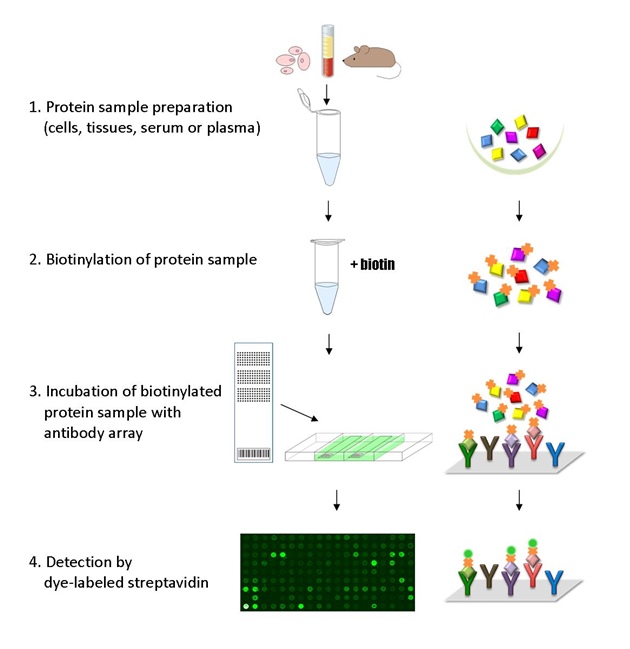
![]() GAL File (To download, right click on the file name, then choose “Save target as”)
GAL File (To download, right click on the file name, then choose “Save target as”)
Beyrakhova K, Li L, Legionella pneumophila effector Lem4 is a membrane-associated protein tyrosine phosphatase, JBC, 2018 July 5, doi: 10.1074/jbc.RA118.003845
Chen H, Gao L, Decrease in SHP-1 Enhances Myometrium Remodeling via FAK Activation Leading to Labor, Am J Physiol Endocrinol Metab. 2020 Apr 28. doi: 10.1152/ajpendo.00068.2020
Ding Y, Wu M, Seed-targeting anti-miR-21 inhibiting malignant progression of retinoblastoma and analysis of their phosphorylation signaling pathways, Experimental Eye Research, May 2014, 122: 1-8
Du F, Sun L, DDIT4 promotes gastric cancer proliferation and tumorigenesis through the p53 and MAPK pathways, Cancer Commun (Lond), 2018 38(1):45
Makishima H, Sugimoto Y, CBL mutation-related patterns of phosphorylation and sensitivity to tyrosine kinase inhibitors, Leukemia 2012, Jul;26(7):1547-54
Markovics A, Toth DM, Regulation of autoimmune arthritis by the SHP-1 tyrosine phosphatase, Arthritis Res Ther. 2020 Jun 26;22(1):160. doi: 10.1186/s13075-020-02250-8.
Noe N, Shim A, Mesenchyme-specific deletion of Tgf-β1 in the embryonic lung disrupts branching morphogenesis and induces lung hypoplasia, Lab Invest. 2019 April 25. https://doi.org/10.1038/s41374-019-0256-3
Xu N, Yuan H, Activation of RAW264.7 mouse macrophage cells in vitro through treatment with recombinant ricin toxin-binding subunit B: Involvement of protein tyrosine, NF-κB and JAK-STAT kinase signaling pathways, International Journal of Molecular Medicine 2013 Sep;32(3):729-35
Services
If you don’t have access to a microarray, send the finished arrays to our lab for scanning. Raw scan images are delivered in tiff format.
Cost: Free
Array Image Quantification and Analysis Service includes data extraction, data organization and analysis of the array images obtained through our array scanning service.
Cost: $250 per slide
Complete Antibody Array Assay Service allows investigators to send research samples to our laboratory for analysis. There is no need to purchase the arrays and reagents and running the assays yourself. Simply select the array of your choice, and then send off the samples to our lab. This convenient hands-off approach offers quick turnaround and reliable results, saving you valuable time and resources. All assays will be performed by our highly trained scientists at our headquarter in Sunnyvale, California. Results are delivered by email in 1-3 weeks.
Cost: $1,520 per sample

